The kind of customer service you offer to your customers can make or break your business. Providing excellent customer service can make all the difference in building strong relationships, retaining loyal customers and attracting new ones. But what exactly is good customer service?
In this article, we’ll explore the definition of good customer service, delve into its key elements, highlight its benefits, and provide practical tips on how to deliver exceptional customer service. To illustrate these concepts, we’ll share some real-life examples of companies that excel in providing an outstanding customer experience.
So get ready to discover all the secrets that will leave your customers raving about their experience with your business.
Table of Contents
What is good customer service?
Good customer service means providing assistance and support to customers before, during, and after a purchase or interaction with a company. It goes beyond addressing customer’s needs. You should strive for creating a positive and memorable experience that leaves the customer feeling valued, heard and satisfied.
E-commerce, SaaS business, retail, healthcare, marketing… Regardless of the industry you operate in, good customer service is about going the extra mile to meet and exceed customer expectations, leaving a lasting impression that encourages repeat business and positive word-of-mouth recommendations.
For example, in the retail industry, good customer service means having knowledgeable and friendly employees who are ready to help customers find the right products and offer suitable recommendations.
A SaaS (Software as a service) company can provide customer service by offering prompt and personalized support through multiple channels, such as live chat, email, and phone. By actively listening to customer feedback, they can ensure continuous improvement and implement new features that will enhance the customer experience and meet their evolving needs.
I like that LiveAgent provides such close support to our team, never leaving our agents without a reply. Also, they care about their customers and provide close interactions.
Happy customer review
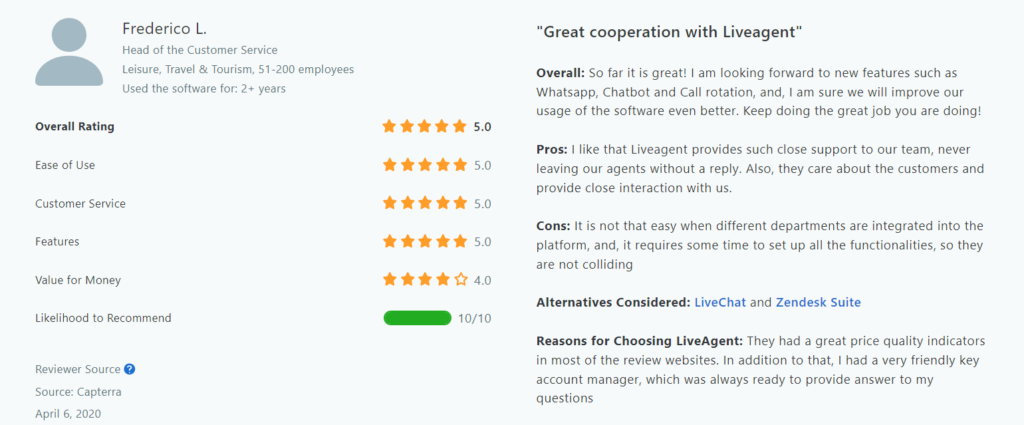
I really love the quick, responsive and helpful customer service given by LiveAgent. They have always gone above and beyond in answering questions, without leaving you waiting for hours or days trying to DIY it yourself.
Satisfied customer review
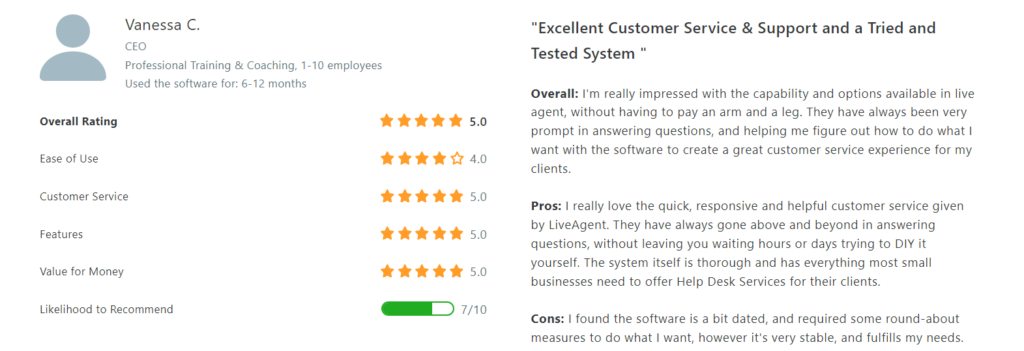
7 key elements of good customer service
Good customer service is built on several key elements that work together to create a positive experience for customers. These elements include:
- Clear communication: Effective communication is essential in customer service. Therefore, the ability to communicate clearly is a key skill that every member of your support team should possess. It’s important to actively listen to customers, understand their needs, and provide clear information or solutions. Communication should be friendly, respectful, and easily understandable.
- Empathy and patience: Good customer service involves putting yourself in the customer’s shoes and trying to understand their perspective. Whether you are dealing with frustrated customers or customers who are letting out their anger, it is essential to stay calm and collected. Let them talk and show empathy towards their concerns or frustrations. As a result, it will help you build a connection and fosters a sense of trust and support.
- Personalization: Treating customers as individuals and tailoring the service to their specific needs and preferences is another critical element. This may involve remembering previous interactions, providing personalized recommendations, or addressing customers by their names to create a more personalized experience.
- Problem-solving mindset: More times than not, it is up to the customer support representatives to take the initiative and find solutions or offer suitable alternatives that will meet the needs of the customer. Therefore, having a proactive problem-solving approach can turn a potentially negative situation into a positive one.
- Knowledge and expertise: As the saying goes, knowledge is key. And your customers seek assistance from knowledgeable experts who can provide accurate information and guidance. This means that you need to have well-trained staff who have necessary skills to solve customer problems and answer their questions. A knowledgeable staff not only resolves issues but also cultivates confidence, shaping a stellar customer service journey.
- Follow-up and aftercare: Going the extra mile by following up with customers after their purchase or interaction shows them that you value their satisfaction even after the transaction. This may involve seeking feedback, addressing any concerns, or offering additional assistance if needed.
- Proactiveness: Take initiative and identify potential issues or needs that customers may have before they even reach out. Providing proactive support shows customers that the company values their satisfaction and is dedicated to providing exceptional service. Plus, you can prevent problems from occurring and offer tailored solutions to enhance the overall customer experience.
6 benefits of good customer service
Delivering good service is a key ingredient to maintaining long-term profitability in today’s diverse and highly competitive marketplace. Studies show that 80% of customers say the experience provided by a company is just as important as the product/services they offer.
Moreover, consumers don’t just expect great service, they are ready to pay for it. According to Marketsplash, a remarkable 90% of customers are willing to pay more to receive a higher level of service and personalized customer care. In addition, 89% say that offering online self-service solutions also influences their willingness to pay extra.
This shows that by providing exceptional service, companies can enhance customer loyalty, generate positive word-of-mouth referrals, and ultimately drive revenue growth. So let’s dive into the various advantages that come with delivering top-notch customer service:
Customer insight and market understanding
By gaining a deep understanding of customers’ needs, preferences, and pain points, businesses can personalize their service to meet those specific requirements. There are various methods to gain customer insights. These methods involve conducting customer surveys, analyzing customer feedback, or tracking customer behavior and purchasing patterns. Use this data to identify areas for improvement, and make informed decisions to enhance the overall customer experience.
Software solutions like LiveAgent can also be valuable in delivering excellent customer service. LiveAgent combines ticketing, live chat, call center, and social media management capabilities into one platform, enabling businesses to centralize customer interactions and gain a comprehensive overview of customer needs. Its robust reporting and analytics features provide valuable insights that can be used to optimize customer service operations and improve customer satisfaction.
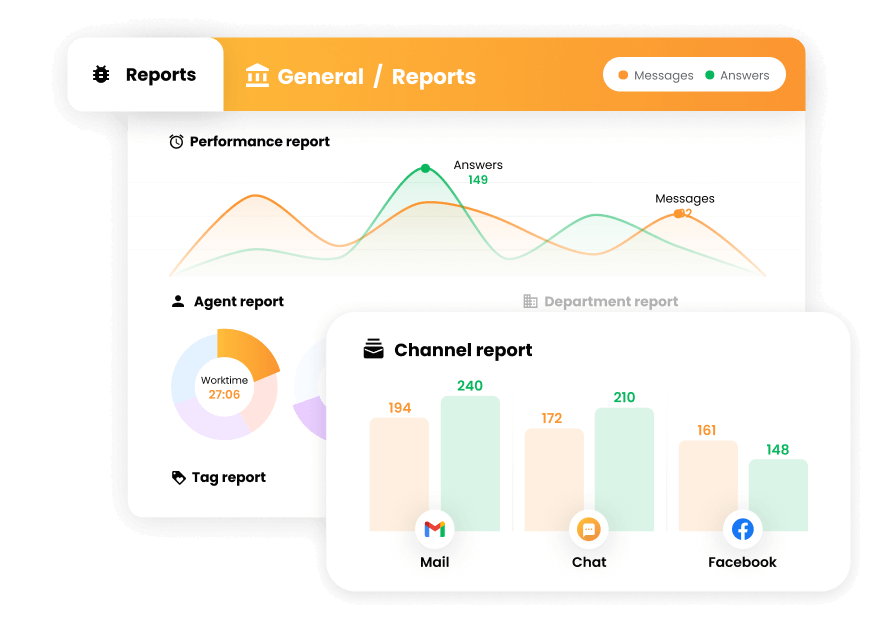
Building customer loyalty
Having a loyal customer base is crucial for long-term success. Loyal customers not only make repeat purchases, but they also act as brand advocates, spreading positive word-of-mouth. This leads to increased customer retention, higher profitability, and a competitive advantage on the market. Making your customers feel valued contributes to their increased loyalty. Moreover, they are more forgiving when mistakes happen and are more likely to give constructive feedback.
If you want to dive deeper into the topic of building a steady and loyal customer base, we have a separate article on How to build a steady and loyal customer base that explores the importance of customer loyalty, strategies for customer retention, and how to measure and calculate customer loyalty and retention.
Higher customer lifetime value
Customer lifetime value (CLV) is a metric that calculates the total revenue a customer is expected to generate over their entire relationship with a business. It takes into account the customer’s purchasing patterns, average order value, and the duration of their relationship.
By knowing the potential value of each customer, businesses can focus on cultivating long-term relationships and providing amazing customer service that leads to repeat purchases and increased profitability.
So how can a business enhance customer lifetime value? By exceeding customer expectations, building trust, offering personalized experiences, and addressing customer needs, you can prolong the customer relationship, encourage repeat purchases, and potentially upsell or cross-sell additional products or services. To achieve that, you can consider to:
- Offer loyalty programs
- Provide personalized marketing campaigns
- Continuously improve product quality and innovation
- Offer additional value-added services or benefits
- Implement customer suggestions for improvement
Positive word of mouth and referrals
People are much more likely to trust recommendations from friends, family, or online reviews than traditional advertising. Therefore, it is a powerful way to get your customers to do the marketing for you and act as a form of endorsement that can greatly influence the purchasing decisions of others.
Providing excellent customer service to your current customers can encourage them to become your brand advocates and actively promote the business to their network. It can also increase brand visibility and ultimately drive business growth. However, it is important to keep in mind that referrals can also work in a negative way as well. If you provide inadequate customer service, your customers can share their bad experiences which can have a negative effect on your reputation and drive people away.
With social media and online review platforms, customers have a platform to express their opinions publicly. By monitoring and responding to customer feedback, businesses can address concerns, handle negative reviews effectively, and improve their overall reputation. Keeping an eye on customer sentiment allows businesses to proactively manage their online presence and ensure that positive word-of-mouth is fostered.
Faster problem resolution
When customers have their issues promptly addressed and resolved, it demonstrates the company’s commitment to their satisfaction. It fosters trust, reduces frustration, and ensures a positive overall experience.
However, if customers don’t receive prompt resolutions, it can have several negative consequences. They may become dissatisfied, share their bad customer service experience with others, or even switch to one of your competitors. This can lead to customer churn, damage to the company’s reputation, and a potential loss of revenue.
LiveAgent can be a valuable tool for improving response and resolution times. With its ticketing system, businesses can efficiently manage and organize customer inquiries, ensuring that no issues slip through the cracks. The live chat feature also enables real-time communication with customers, allowing for quick responses and instant problem resolution. In addition, LiveAgent’s knowledge base improves the resolution process by providing customers with easy access to relevant information and solutions through self-service.
Enhanced employee satisfaction
The satisfaction of your employees is just as important. Happy and engaged employees are more motivated, productive, and likely to provide exceptional customer service. They become advocates for the company and contribute to a positive work environment.
Here is how you can improve employee satisfaction:
- Provide training programs, workshops, and opportunities for skill development. This helps them feel valued and enhances their confidence in handling customer interactions.
- Recognize and reward achievements through verbal praise, monetary rewards, or advancement opportunities. Celebrating successes reinforces a positive and rewarding work environment.
- Encourage your employees to share their ideas, concerns, and feedback. Establish channels for open communication, such as regular team meetings or suggestion boxes.
- Provide a healthy work-life balance by offering flexible working hours, remote work options, or wellness programs that prioritize employee health and happiness.
- Build a company culture that emphasizes teamwork, collaboration, and mutual respect. Recognize the importance of each employee’s contributions to the success of the business.
7 qualities of good customer service
1. Responsiveness
Being responsive means promptly addressing customer inquiries, concerns, or complaints. Forbes research shows that 65% of customer emails are ignored, and they never receive a response from the company. Being easily accessible through various support channels, acknowledging service requests, and actually responding to customers in a timely manner are must-have aspects of great customer care.
2. Speed and efficiency
Modern consumers are impatient and expect their service requests to be handled quickly and efficiently. In PwC’s research, more than 80% of consumers say that speed and efficiency are some of the most important aspects of good customer service.This is due to the fact that consumers hate contacting a company over and over again regarding the same issue.
3. Competence
The professional competence of frontline employees is one of the most essential characteristics of quality customer service. According to Zippia, 39% of customers say that a customer service agent’s lack of knowledge is one of the most frustrating aspects when it comes to customer service. In addition, 28% of customers say that having to repeat the same information over and over again is also just as frustrating.
4. Consistency
Providing consistent positive experiences is very important as consumers use multiple channels to engage with brands. Moreover, the consumers increasingly demand an effortless and unified service experience across every touchpoint during every interaction. As said by McKinsey, consistent customer experience across the entire customer journey increases customer satisfaction and builds trust.
5. Professionalism and courtesy
Common courtesy and professionalism are the foundation of high-quality customer service. This involves being polite, respectful, friendly, and following proper service etiquette when interacting with customers. The level of professionalism demonstrated by service employees greatly affects a customer’s experience and perception of the business. In fact, 77% of consumers say they are likely to switch brands if they experience rudeness from customer service representatives. If you would like to dive deeper into the specific customer service skills that make representatives stand out, be sure to check out our blog post about customer service skills that will make you stand out.
6. Convenience
Today’s customers want to be able to contact a business through various different channels they find the most convenient. These channels may include email, live chat, phone call, or social media platforms. More than 90% of customers say that convenience is the most important aspect of good customer service. Therefore, it is important for businesses to offer support through the communication channels their customers rely on and prefer the most to make it as simple as possible for them to reach out.
7. Being proactive
Would you believe that based on a study done by Statista, around 70% of customers have a more favorable view of businesses that offer proactive customer service? Proactively reaching out to your customers and offering assistance will show them that you care about their experience and that you want to help them with whatever they need. This can have a positive effect on building loyalty and trust.
6 tips to deliver top-notch customer service
To deliver top-notch customer service, consider implementing the following tips and practices:
Implement self-service options
Create a comprehensive knowledge base that is easily accessible by your customers as well as customer service agents. You should include answers to FAQs, troubleshooting guides, video tutorials, step-by-step instructions, and product/service information. This enables customers to find answers to common questions and resolves issues quickly, saving time for both the customer and your customer service team.
According to our research, 66% of customers try to solve their issues on their own before they contact customer support. LiveAgent offers an intuitive knowledge base software that helps you create and manage your knowledge bases and make them accessible for every customer.
Offer omnichannel support
Omnichannel customer service is a great way of providing seamless customer support across various channels, such as phone calls, email, live chat, or social media platforms. Customers are able to choose the channel they are the most comfortable with, which enhances convenience and accessibility. It also helps businesses to provide a consistent level of support throughout the entire customer journey by integrating all the communication channels.
A great way to provide this level of support is by implementing a solution like LiveAgent help desk software. With LiveAgent, your customer support team can easily manage all the customers interactions from one universal inbox instead of switching between multiple platforms and losing track of all the customer inquiries.
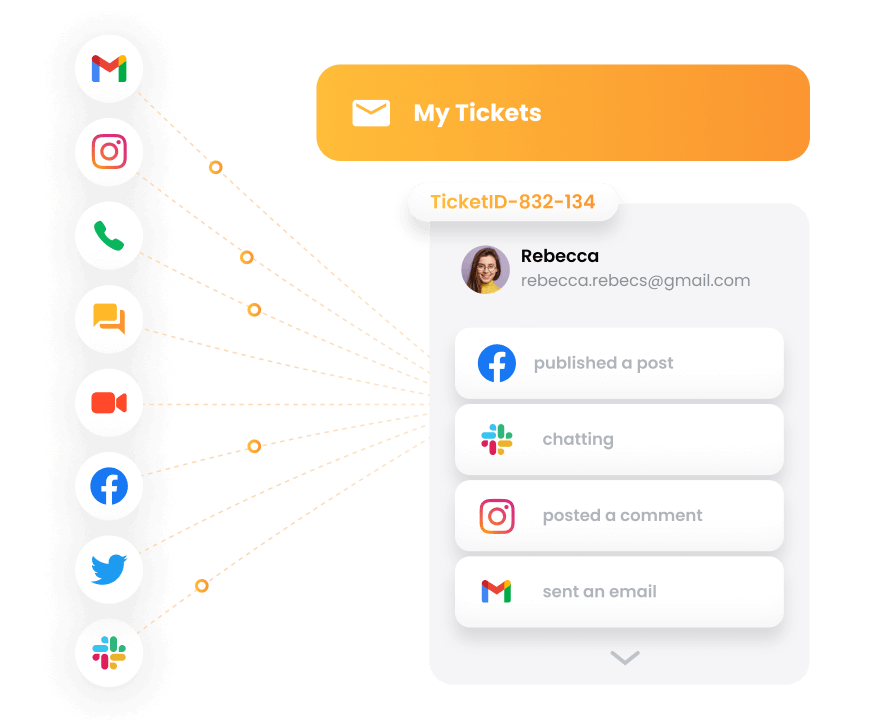
Streamline with a ticketing system
Ticketing system is a tool that converts all customer requests into tickets and helps you track, prioritize and automatically assign tickets to appropriate departments/agents. It also improves ticket management by storing all conversations in one centralized place no matter what channel it comes from.
LiveAgent offers a ticketing tool that can help you organize all communications and keep any customer communication in one ticket thread. You can also create internal tickets that are only visible by other team members. You can use them as notes, reminders, or share important information with your colleagues to facilitate collaboration.
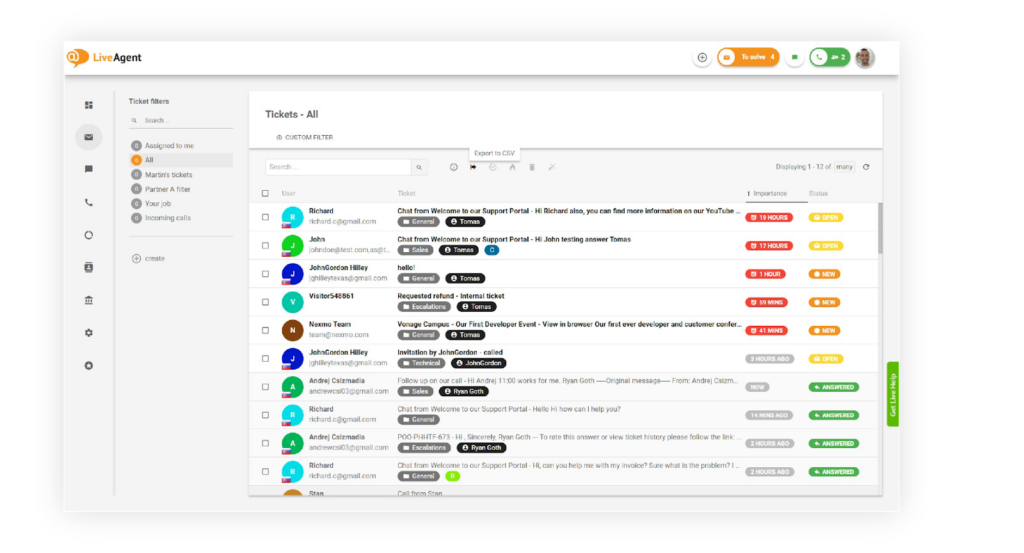
Practice active listening
When customers reach out to customer support or express their feedback, they want to feel understood and valued. Active listening is about giving your full attention to the customer, focusing on their words, tone of voice, or emotions. It helps you grasp the true nature of the customer’s issue. By doing so, you can build a better connection and trust.
Additionally, active listening enables customer support agents to avoid any potential misunderstandings. By clarifying and asking additional questions, they can ensure that they fully understand the issue expressed by the customer. This helps prevent unnecessary delays or frustrations in resolving the problem and promotes a more efficient and effective support experience.
Show gratitude and appreciation
By expressing gratitude, whether it is through a personalized thank-you note or a simple verbal acknowledgment, you create a memorable and positive customer experience. This can lead to increased customer loyalty and advocacy because it makes the customer feel valued for choosing your business. Customers who feel appreciated are more likely to become repeat customers and recommend your business to others, driving growth through positive word-of-mouth.
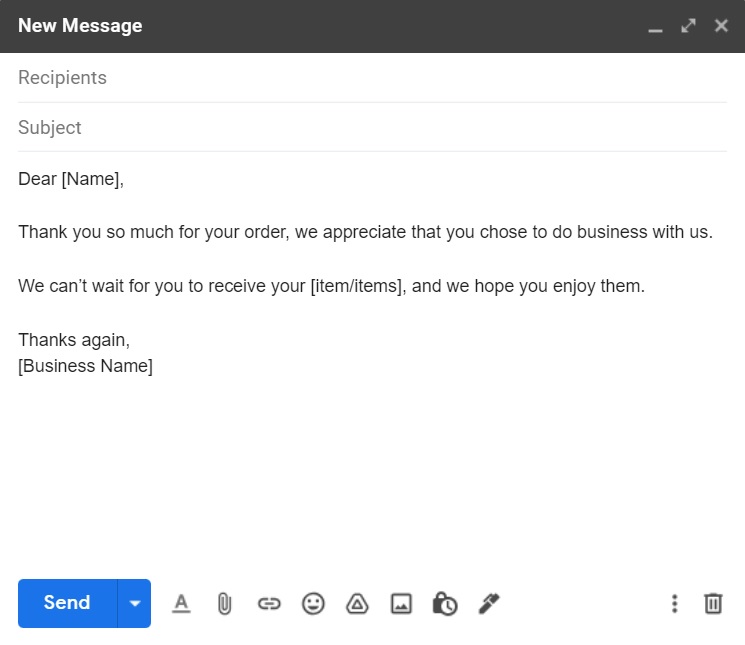
Showing gratitude and appreciation can also help in diffusing or de-escalating potentially tense situations. When a customer is frustrated or dissatisfied, expressing gratitude for their feedback or patience can help shift the tone of the conversation. It shows that you genuinely care about their concerns and are willing to work towards a resolution. This can help turn a negative experience into a positive one.
Train and empower your team
Training and empowering your team is crucial if you want to deliver superior customer service because they are the front line of your business. Equipping them with the necessary knowledge, skills, and confidence enables them to handle customer inquiries more effectively. Well-trained team members are more likely to provide accurate information, offer appropriate solutions, and deliver exceptional service, contributing to customer satisfaction and loyalty.
There are several ways to train your customer service team effectively, as well as give them the opportunity to make decisions:
- Offer comprehensive training sessions to ensure they have in-depth knowledge of what your business offers (understanding features, benefits, and potential issues that customers may encounter).
- Train them to enhance their communication skills, active listening abilities, and problem-solving techniques.
- Consider role-playing exercises to simulate real-life scenarios to show them how to handle different situations.
- Trust their judgment and provide them with guidelines that can boost their confidence and speed up problem resolution process
- Provide your team with access to comprehensive knowledge bases, FAQs, and other tools that enable them to find information independently.
- Involve team members in decision-making and process improvement discussions. Seek their input and insights on how to enhance the customer experience.
Inspire your team
Inspiring your team is also very important because it sets the tone for how your business interacts with customers. When your team members feel motivated and inspired, they are more likely to go above and beyond to meet customer needs, exceed expectations, and create memorable experiences.
As Chris LoCurto, a leadership and business coach, stated, “Great customer service doesn’t mean that the customer is always right, it means that the customer is always honored.“
For more inspiring customer service quotes, check out our separate article full of insightful phrases to motivate your team on a daily basis.
5 Real-life excellent customer service examples
Let’s look at some examples of good customer service in practice:
Zappos
Zappos is an online retail company that is known for its exceptional customer service through Twitter. Their customer support team actively engages with customers, resolves issues, answers queries, and offers timely assistance in a friendly and helpful manner.

Zappos is also known for their “going extreme for the customers” approach by offering free shipping for any number of back-and-forth transactions, or their 365-days return policy if a customer is not satisfied with the product.
Tony Hsieh, the CEO of Zappos, says that even though this approach costs them some money, they prefer to invest money in customer service rather than on advertising. He thinks that this helps them create long-lasting relationships with their customers and gain positive word-of-mouth referrals. And so far, it is working for them exceptionally well.
Social media provides a direct line of communication between brands and customers, offering a fast and convenient way for customers to reach out with inquiries, feedback, or complaints. Actively engaging on social media helps you demonstrate your commitment to customer satisfaction, build relationships, and leverage the power of word-of-mouth marketing.
Invest more into your customer service, and see how it will positively impact customer satisfaction, loyalty, and ultimately the success of your business. By allocating resources to enhance customer service, you can improve the overall customer experience, reduce customer churn, and increase customer lifetime value.
Lego
Another great way to show your customers that you care is by offering random acts of kindness. It doesn’t have to be anything big. The important thing is listening to your customers, what they want or need and act on it. One example of a brand that does this well is Lego.

With a rich history spanning over 80 years, Lego has captivated generations of children and adults alike, inspiring creativity, imagination, and problem-solving skills. But what makes Lego even more special?
They send out replacement figures or extra pieces if a child loses their own. This helps to surprise and delight their customers. This may seem like nothing big, but by simply offering something extra, they create memorable customer experiences that make their customers come back again.
Offering something extra to your loyal customers can make a big difference. Examples of these gestures can include offering personalized discounts, providing free shipping, extending return periods, offering complimentary drinks, or sending surprise gifts with purchases. These acts of kindness show customers that you value them and genuinely care about their satisfaction.
So if you want to create a positive impression and foster a stronger connection with your customers, this may be the way! When people feel appreciated, they are more likely to become repeat customers, refer others to your business, and leave positive reviews. Additionally, it can differentiate your brand from competitors and contribute to a positive brand image.
Apple
Another example of great customer service is Apple. With their diverse range of products, Apple has revolutionized the tech industry and gathered a devoted following worldwide. But that’s not all! Not only does Apple provide great products, they also set the bar high when it comes to their customer service by offering a personalized approach to technical support.

Their Apple Support app offers easy access to an extensive knowledge base, live chat support, as well as the possibility to schedule a phone call with one of their experts. Apple is also known for hiring only the best to ensure that their employees know what they are talking about and have an in-depth knowledge of their products/services. The combination of personalized support and technical expertise makes Apple stand out from the crowd and offer excellent customer experience. That is why people stay loyal to them and keep purchasing from them.
If you also want to deliver superb support, providing proper training for your customer support team is essential. Ensure they have in-depth knowledge of your products or services, understanding all the ins and outs, so they can effectively assist customers. You can also create a comprehensive knowledge base where customers can easily access FAQs, tutorials, and troubleshooting guides, enabling them to find solutions independently.
But don’t forget that personalized support is key. Take the time to understand customers’ concerns and provide tailored solutions or recommendations. This not only enhances their experience but also fosters a sense of care and appreciation. By investing in these practices, you can deliver exceptional support that keeps customers coming back.
Uber
Uber is a transportation and ride-hailing platform that revolutionized the way people travel by connecting riders with drivers through a mobile app. With its competitive pricing and extensive availability, Uber has become a popular choice for individuals seeking reliable and efficient transportation services.

But how was Uber able to stand out? They found a way to provide excellent customer service by identifying all the pain points people had to face while hailing a taxi, and eliminating them. With Uber, people know exactly where their ride is at any time, how much time it will take for the car to come and pick them up, and who is their driver.
Additionally, customers are able to rate their driver and vice versa. This is a great way to monitor the satisfaction and step in when necessary. The drivers often offer you something to drink during your ride, which only improves the customer experience and satisfaction. Plus, the possibility to pay with your credit card directly through the app is very convenient as most people do not carry cash on them anymore.
Giving your customers and employees the opportunity to provide feedback and express their opinions is crucial for many reasons. First of all, it shows that their opinions are valued, fostering a sense of engagement and satisfaction. Second of all, feedback can help identify areas of improvement, highlighting strengths and weaknesses in the business. It also provides valuable insights into customer preferences, expectations, and pain points. Employee feedback, on the other hand, can uncover operational gaps or areas where additional support or resources are necessary.
Surveys, ratings, comments, or suggestion boxes are some methods to encourage feedback. Gathering and using this feedback can help businesses make data-driven decisions, tailor products and services to meet customer evolving needs, enhance customer satisfaction, and create a positive work environment for employees.
Ikea
With a focus on offering affordable and stylish solutions for everyday living, IKEA has gained worldwide popularity. More than that, it is a popular store for individuals and families to spend their free time at.

It is another example of a company that was able to find a creative and effective way to provide great customer experience in both physical and online stores. Their stores provide an experience where their visitors can not only shop, but spend their day. They offer food and even areas for children to play, so the parents do not have to worry about them, and they can calmly shop.
Their online store is also very innovative when it comes to customer experience. They developed an app called IKEA Place, where their customers can play with 3D life-sized furniture and place it in their home through their smartphone camera.
Innovation is also an important aspect when it comes to improving customer experience. It allows companies to stay competitive and meet evolving customer expectations. By finding ways to innovate their products/services, businesses can offer new and improved solutions that address customer needs and enhance their satisfaction. Innovation enables companies to differentiate themselves, attract new customers, and retain existing ones.
By understanding and anticipating customer needs, businesses can design innovative offerings that provide added value and solve their problems and concerns. Through innovation, companies can introduce features, functionalities, or experiences that customers didn’t even know they required, delighting them and building long-term loyalty. Customer-centric innovation helps businesses stay relevant, maintain a competitive edge, and foster continuous improvement in the ever-changing business landscape.
You are one step closer to excellent customer service
To wrap this up, providing good customer service is key if you want to run a successful business. In this article, we have explored the key elements of good customer service, such as clear communication, empathy, and personalization, as well as the various benefits it brings.
In order to deliver top-notch customer service, we provided you with some practical tips that businesses can implement, such as offering self-service options, omnichannel support, investing in a reliable ticketing system, and more. We also highlighted real-life examples of companies known for their excellent customer service to inspire and show you how you can achieve it as well.
LiveAgent is a comprehensive tool that can help you start offering great customer support by streamlining your customer service operations. With features like ticketing, live chat, social media integrations, and analytics, LiveAgent enables efficient management of customer interactions. You can try LiveAgent’s 30-day free trial and experience all the benefits firsthand.
Try out LiveAgent for FREE
Handle all customer inquiries from one interface. Start improving your customer service with a 30-day free trial right away!
Frequently Asked Questions
What are the 5 must-have qualities of support reps?
There are certain qualities and characteristics necessary for service reps to ensure quality service. The 5 must-have qualities of support reps are empathy, patience, positive attitude, good communication skills, and problem-solving thinking.
What are the most common mistakes that negatively influence effective customer service?
The most common mistakes that negatively influence effective customer service include poor communication, lack of empathy, inadequate training of staff, and failure to address customer concerns or complaints promptly. These mistakes can lead to frustration, dissatisfaction, and ultimately, loss of customers.
What is the role of feedback in improving customer service?
Feedback provides valuable insights into customer experiences, preferences, and areas for improvement. By actively seeking and listening to customer feedback, businesses can identify and address issues, make informed decisions, and enhance their service to better meet customer needs and expectations.
How can you provide outstanding customer service using LiveAgent?
LiveAgent is software that provides a comprehensive set of tools to take your customer service to the next level. It provides features such as ticketing tools, live chat, social media integration, and analytics that can help you efficiently manage and prioritize customer queries, engage in real-time conversations, and monitor and respond to customer feedback across various channels. With LiveAgent, businesses can deliver personalized and prompt support, ultimately enhancing the customer service experience.
What is excellent customer service in BPO?
Excellent customer service in Business Process Outsourcing (BPO) involves providing prompt, personalized, and efficient support to customers. This includes addressing their inquiries and concerns in a timely manner, showing empathy and understanding, and ensuring a positive customer experience. It also involves going above and beyond to meet customer needs and expectations, such as anticipating their needs and providing proactive solutions. Additionally, excellent customer service in BPO may involve leveraging technology and data to personalize interactions and provide accurate and relevant information to customers. Overall, excellent customer service in BPO is characterized by a commitment to customer satisfaction and building strong, long-term relationships with clients.
Customer appreciation guide: how to say thank you in 19 ways
Discover 19 creative customer appreciation ideas to boost loyalty and satisfaction. Strengthen relationships with heartfelt gestures and gratitude!
Understanding customer retention: Definition, importance, and strategies
Master customer retention with 13 proven strategies, key metrics, and real examples. Boost loyalty, profits, and brand reputation today!

 Български
Български  Čeština
Čeština  Dansk
Dansk  Deutsch
Deutsch  Eesti
Eesti  Español
Español  Français
Français  Ελληνικα
Ελληνικα  Hrvatski
Hrvatski  Italiano
Italiano  Latviešu
Latviešu  Lietuviškai
Lietuviškai  Magyar
Magyar  Nederlands
Nederlands  Norsk bokmål
Norsk bokmål  Polski
Polski  Română
Română  Русский
Русский  Slovenčina
Slovenčina  Slovenščina
Slovenščina  简体中文
简体中文  Tagalog
Tagalog  Tiếng Việt
Tiếng Việt  العربية
العربية  Português
Português 



